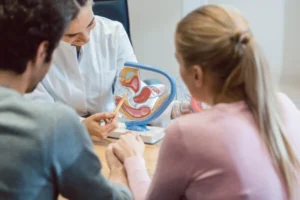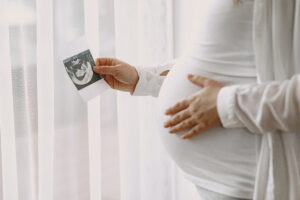A Message to Women Struggling with Infertility: You Are Not Alone

Infertility can be one of the most emotionally challenging journeys a woman can face. It can feel isolating, exhausting, and often misunderstood. If you are navigating this path, remember that you are not alone. At Southern California Fertility Center, we see you, we hear you, and we are here to support you every step of the way.
What to Do If You’re Struggling with Infertility
 The first step is to recognize that seeking help is a sign of strength, not failure. Whether you have been trying to conceive for months or years, connecting with a fertility specialist can provide you with clarity and direction. A reproductive endocrinologist can assess your health, explore treatment options, and create a personalized fertility plan.
The first step is to recognize that seeking help is a sign of strength, not failure. Whether you have been trying to conceive for months or years, connecting with a fertility specialist can provide you with clarity and direction. A reproductive endocrinologist can assess your health, explore treatment options, and create a personalized fertility plan.
At SCFC, we offer compassionate, evidence-based care for women and couples, including IVF, IUI, egg freezing, and advanced diagnostic testing. If you’re unsure where to start, reach out to our team for a confidential consultation. You don’t have to navigate this journey alone.
Understanding the Grief Timeline of Infertility
Grief associated with infertility is real and valid. It often comes in waves, manifesting as sadness, anger, confusion, and guilt, and it doesn’t adhere to a clear timeline. Many women find themselves experiencing this grief each month, especially with every negative pregnancy test or cycle that does not go as hoped.
There is no “normal” duration for grief related to infertility. For some, the pain eases with time or support, while for others, it may linger even after they have built a family. Acknowledging the loss of expectations and dreams is essential for healing. Therapy, support groups, and open communication with your partner can help create space to process these emotions.
Coping with Depression Related to Infertility
 The emotional toll of infertility can lead to feelings of depression and anxiety. Many individuals experience feelings of inadequacy, loss of control, and social isolation, especially when they are surrounded by others who are pregnant or parenting. These emotions can intensify the overall burden of infertility.
The emotional toll of infertility can lead to feelings of depression and anxiety. Many individuals experience feelings of inadequacy, loss of control, and social isolation, especially when they are surrounded by others who are pregnant or parenting. These emotions can intensify the overall burden of infertility.
If you are feeling overwhelmed, know that help is available. Speaking with a mental health professional who understands fertility issues can be incredibly beneficial. Consider exploring mindfulness techniques, journaling, and seeking support through online or in-person communities. It’s important to remember that needing support is not a sign of weakness; it is simply a human experience.
The SCFC team recognizes the emotional challenges associated with infertility. We can refer you to specialized counselors and help coordinate care that addresses both your physical and emotional needs.
The #1 Cause of Infertility in Women
Infertility can result from various causes, and understanding these is essential for finding the appropriate treatment. According to the Mayo Clinic, the most common cause of female infertility is ovulation disorders—conditions in which eggs are not released regularly or at all.
These disorders can be caused by hormonal imbalances, such as Polycystic Ovary Syndrome (PCOS), thyroid problems, or other underlying medical conditions. Fortunately, many ovulation disorders can be treated through lifestyle changes, medication, or assisted reproductive techniques. A thorough evaluation at a fertility clinic can help identify the underlying cause and determine the most effective next steps for treatment.
Meet Dr. Nastaran Foyouzi: Expert in Genetic Endocrinology & Fertility
 Dr. Nastaran Foyouzi is the founding physician and driving force behind the Southern California Fertility Center in La Jolla. As a rare double-boarded specialist in Reproductive Endocrinology & Infertility (REI) and Medical Genetics, Dr. Foyouzi brings an exceptional level of expertise to fertility care.
Dr. Nastaran Foyouzi is the founding physician and driving force behind the Southern California Fertility Center in La Jolla. As a rare double-boarded specialist in Reproductive Endocrinology & Infertility (REI) and Medical Genetics, Dr. Foyouzi brings an exceptional level of expertise to fertility care.
With decades of experience and thousands of successful births, her patients trust her deeply. She has guided many families through complex fertility journeys with precision, compassion, and cutting-edge science.
Dr. Foyouzi also offers specialized genetic services due to her medical genetics background. This includes advanced options such as gender selection, preimplantation genetic testing, and counseling to help reduce hereditary risks for future generations.
Her warm, patient-first approach is consistently praised by women who value her thoroughness, attentiveness, and emotional support. Many reviews highlight her ability to clearly explain every step of the process and care for patients’ overall well-being, not just the biological aspects.
Choosing Dr. Foyouzi means partnering with a fertility expert who combines scientific excellence with heartfelt empathy. Whether you’re facing ovulation issues, complex genetic concerns, or emotionally exhausting cycles, her comprehensive guidance helps women feel supported and empowered.
You deserve answers. Support and Hope
Every woman’s fertility journey is unique, but you should never feel like you have to face it alone. At Southern California Fertility Center, we are committed to helping you find answers, creating a safe space for your emotions, and guiding you on a path forward that is grounded in expertise and compassion.
If you are struggling with infertility, please reach out to us. We are here to listen, guide, and support you every step of the way.
Poor egg quality can be difficult to identify without fertility testing, but some signs may include difficulty conceiving, multiple miscarriages, or failed IVF cycles. Women may also experience irregular or absent periods, as well as poor embryo quality during fertility treatments.
Improving egg quality naturally can be achieved by adopting a healthy lifestyle. Focus on a fertility-boosting diet rich in antioxidants, healthy fats, and lean proteins. Reducing exposure to toxins, quitting smoking, limiting alcohol, and managing stress through acupuncture or meditation can also help improve egg health.
Poor egg quality can be caused by various factors, including aging (especially after 35), hormonal imbalances, genetic abnormalities, lifestyle choices (such as smoking and excessive alcohol), and environmental toxins. Chronic health conditions and certain medications can also affect egg quality.
Foods rich in antioxidants, healthy fats, and essential vitamins can help improve egg quality. Consider adding foods such as leafy greens (like spinach), berries, nuts (like walnuts), fatty fish (such as salmon), and whole grains (like quinoa) to your diet. These foods support hormonal balance and reduce oxidative stress.
Yes, acupuncture can help improve egg quality by promoting blood circulation to the ovaries and balancing hormone levels. It has been shown to support overall fertility by reducing stress and improving ovarian function. Many women incorporate acupuncture alongside other fertility treatments to enhance their chances of conception.
While poor egg quality can make conception more difficult, it is still possible to get pregnant. For women with poor egg quality, assisted reproductive technologies like IVF (with egg retrieval) or egg donation can increase the chances of a successful pregnancy. It’s essential to consult a fertility specialist to explore the best options for your situation.
Supplements like Coenzyme Q10 (CoQ10), Vitamin D, Myo-Inositol, and Folic Acid are commonly recommended to improve egg quality. These supplements help enhance mitochondrial function in eggs, regulate reproductive hormones, and support overall fertility. Consult with your doctor before starting any supplementation.
Late ovulation can sometimes be associated with poor egg quality. Eggs released later in the cycle may not be as viable, and hormonal imbalances can affect ovulation timing. If you’re experiencing late ovulation or irregular cycles, it’s a good idea to consult a fertility expert for evaluation and advice on improving egg quality.



